Opinions and Voices from China-Latin America Youth Thinkers Roundtable
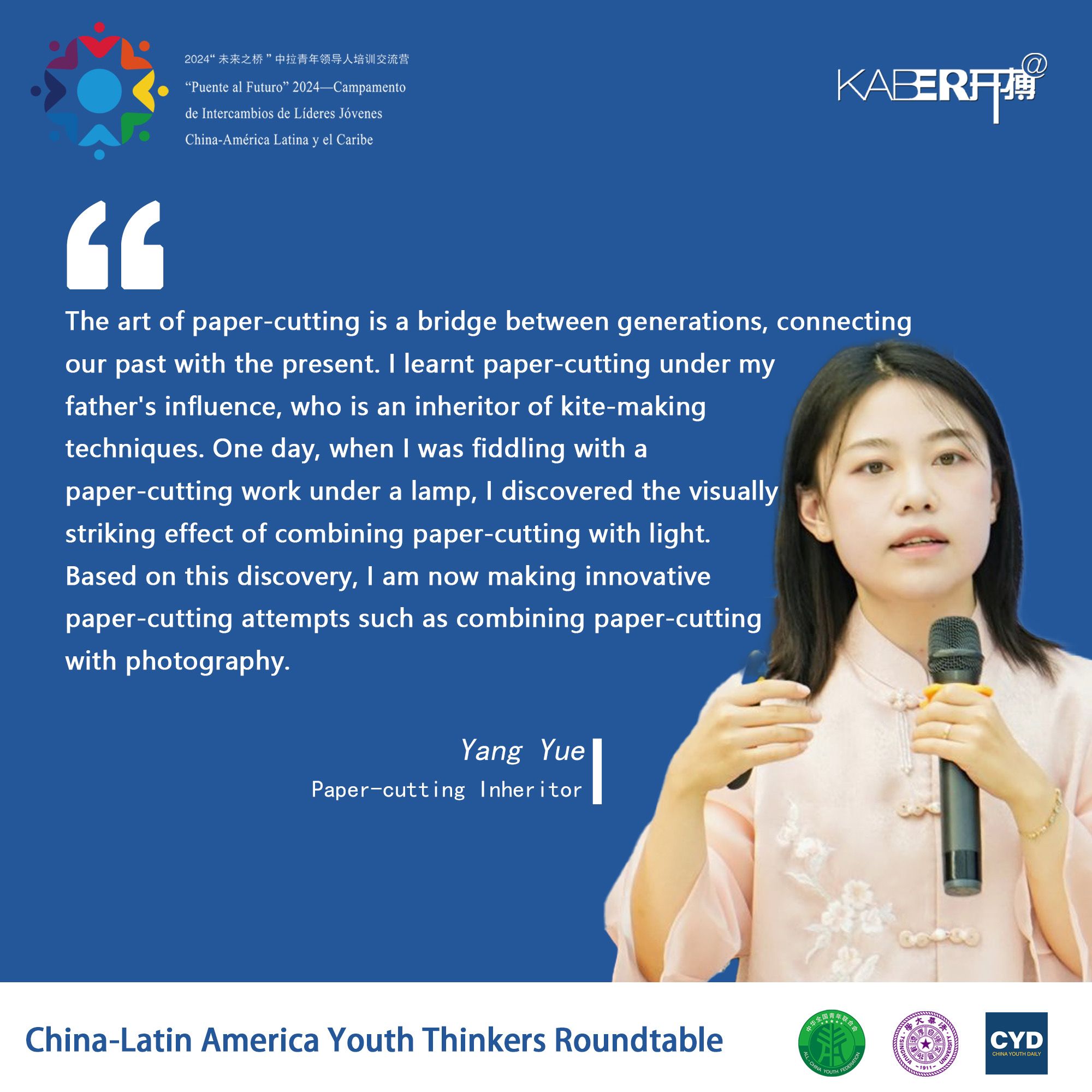
Yang Yue, a Chinese paper-cutting Inheritor, shared her nearly a decade of commitment to safeguarding intangible cultural heritage at the China-Latin America Youth Thinkers Roundtable. She stated, "The art of paper-cutting is a bridge between generations, connecting our past with the present. I learnt paper-cutting under my father's influence, who is an inheritor of kite-making techniques. One day, when I was fiddling with a paper-cutting work under a lamp, I discovered the visually striking effect of combining paper-cutting with light. Based on this discovery, I am now making innovative paper-cutting attempts such as combining paper-cutting with photography".
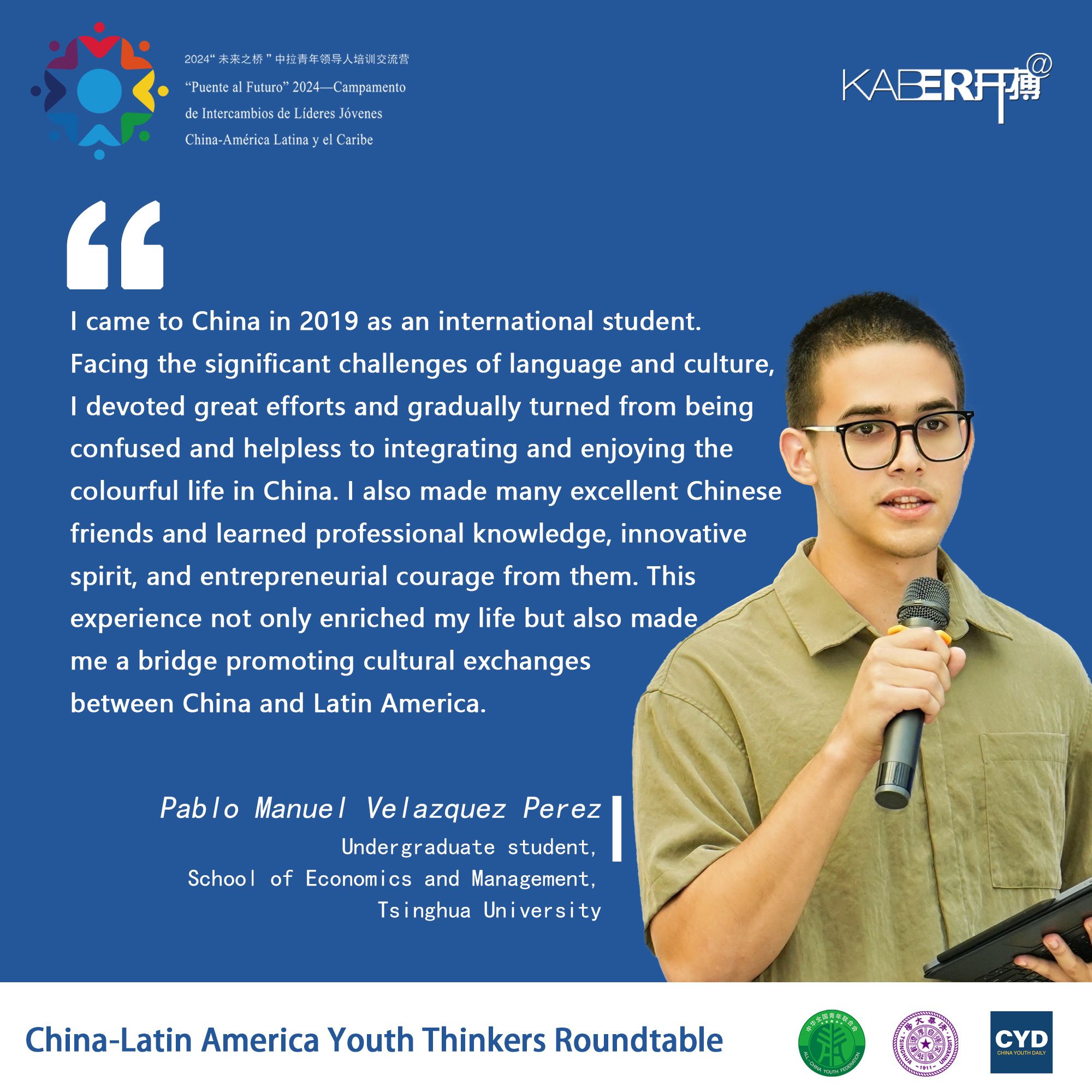
At the China-Latin America Youth Thinkers Roundtable, Pablo Manuel Velazquez Perez, a Cuban student at Tsinghua University, School of Economics and Management, shared the challenges, growth, and opportunities he has encountered during his six-year journey in China. "I came to China in 2019 as an international student. Facing the significant challenges of language and culture, I devoted great efforts and gradually turned from being confused and helpless to integrating and enjoying the colourful life in China. I also made many excellent Chinese friends and learned professional knowledge, innovative spirit, and entrepreneurial courage from them. This experience not only enriched my life but also made me a bridge promoting cultural exchanges between China and Latin America".
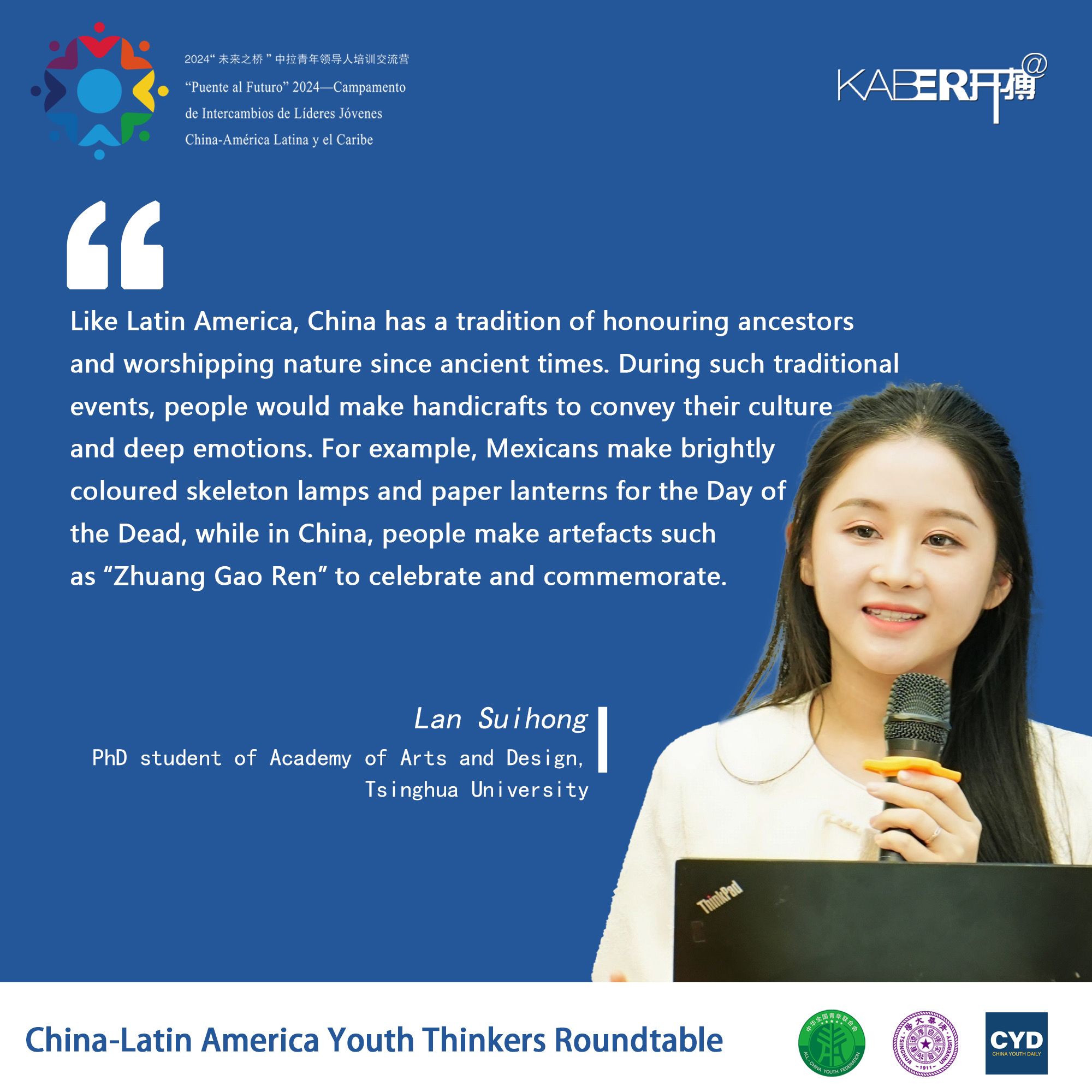
Lan Suihong, a PhD student at Tsinghua University, Academy of Arts and Design, introduced "Zhuang Gao Ren", a unique dough figurine art from Quanzhou, at the China-Latin America Youth Thinkers Roundtable. "Like Latin America, China has a tradition of honouring ancestors and worshipping nature since ancient times. During such traditional events, people would make handicrafts to convey their culture and deep emotions. For example, Mexicans make brightly coloured skeleton lamps and paper lanterns for the Day of the Dead, while in China, people make artefacts such as 'Zhuang Gao Ren' to celebrate and commemorate".
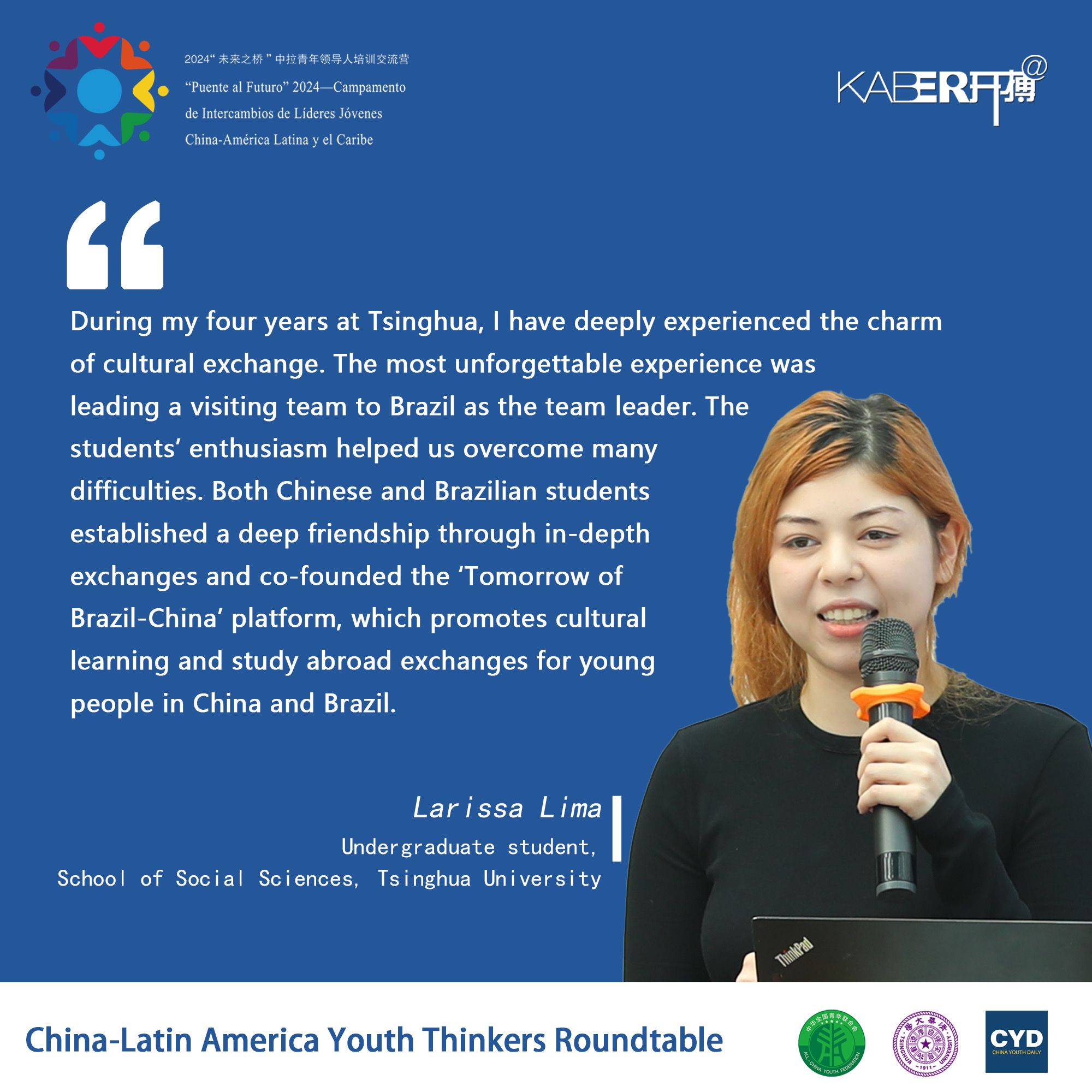
Larissa Lima, a Brazilian student at Tsinghua University, School of Social Sciences, shared her four-year cross-cultural exchange experience in China at the China-Latin America Youth Thinkers Roundtable. "During my four years at Tsinghua, I have deeply experienced the charm of cultural exchange. The most unforgettable experience was leading a visiting team to Brazil as the team leader. The students’ enthusiasm helped us overcome many difficulties. Both Chinese and Brazilian students established a deep friendship through in-depth exchanges and co-founded the ‘Tomorrow of Brazil-China’ platform, which promotes cultural learning and study abroad exchanges for young people in China and Brazil".
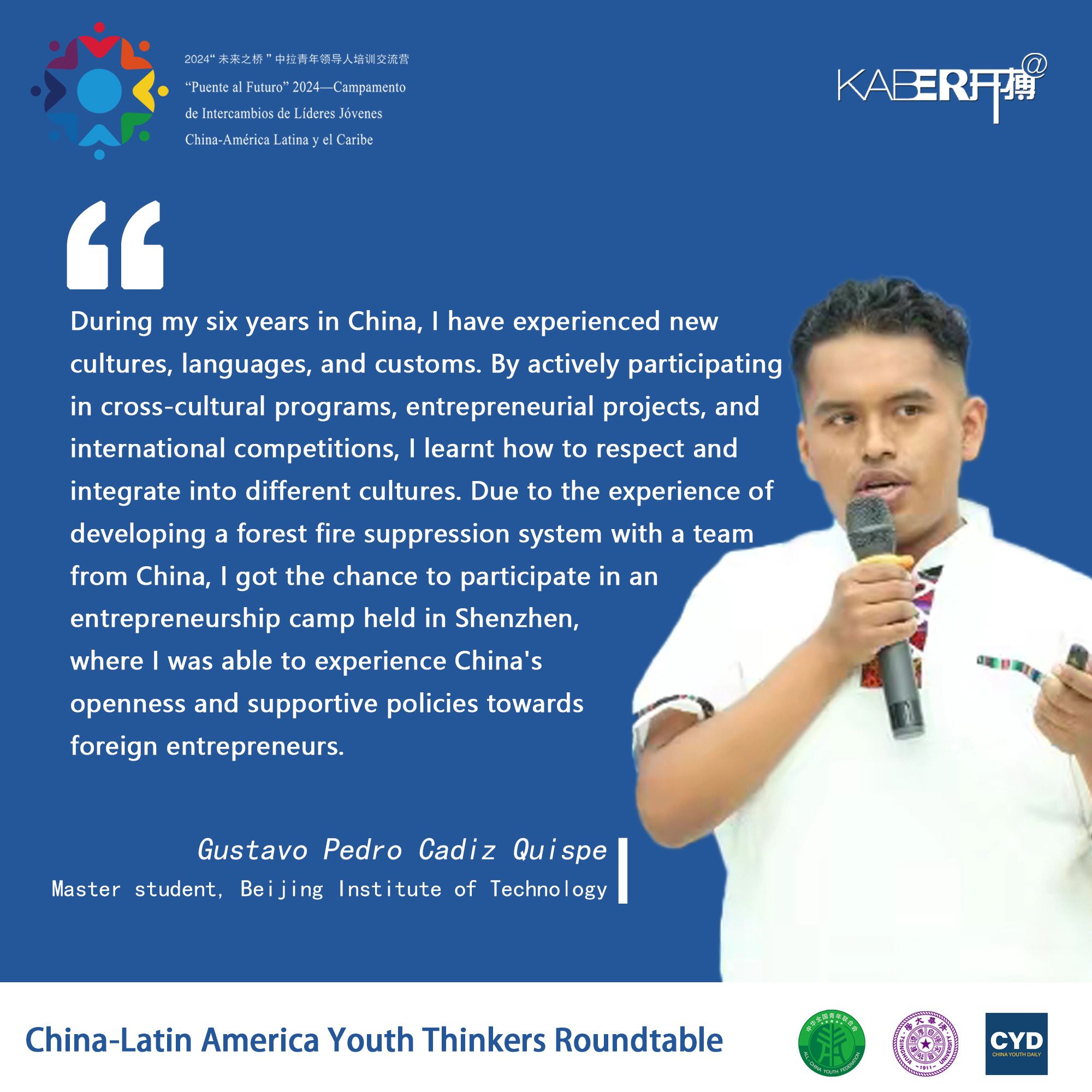
Gustavo Pedro Cadiz Quispe, a Bolivian student at the Beijing Institute of Technology, shared his study and entrepreneurship experience in China at the China-Latin America Youth Thinkers Roundtable. "During my six years in China, I have experienced new cultures, languages, and customs. By actively participating in cross-cultural programs, entrepreneurial projects, and international competitions, I learnt how to respect and integrate into different cultures. Due to the experience of developing a forest fire suppression system with a team from China, I got the chance to participate in an entrepreneurship camp held in Shenzhen, where I was able to experience China's openness and supportive policies towards foreign entrepreneurs".
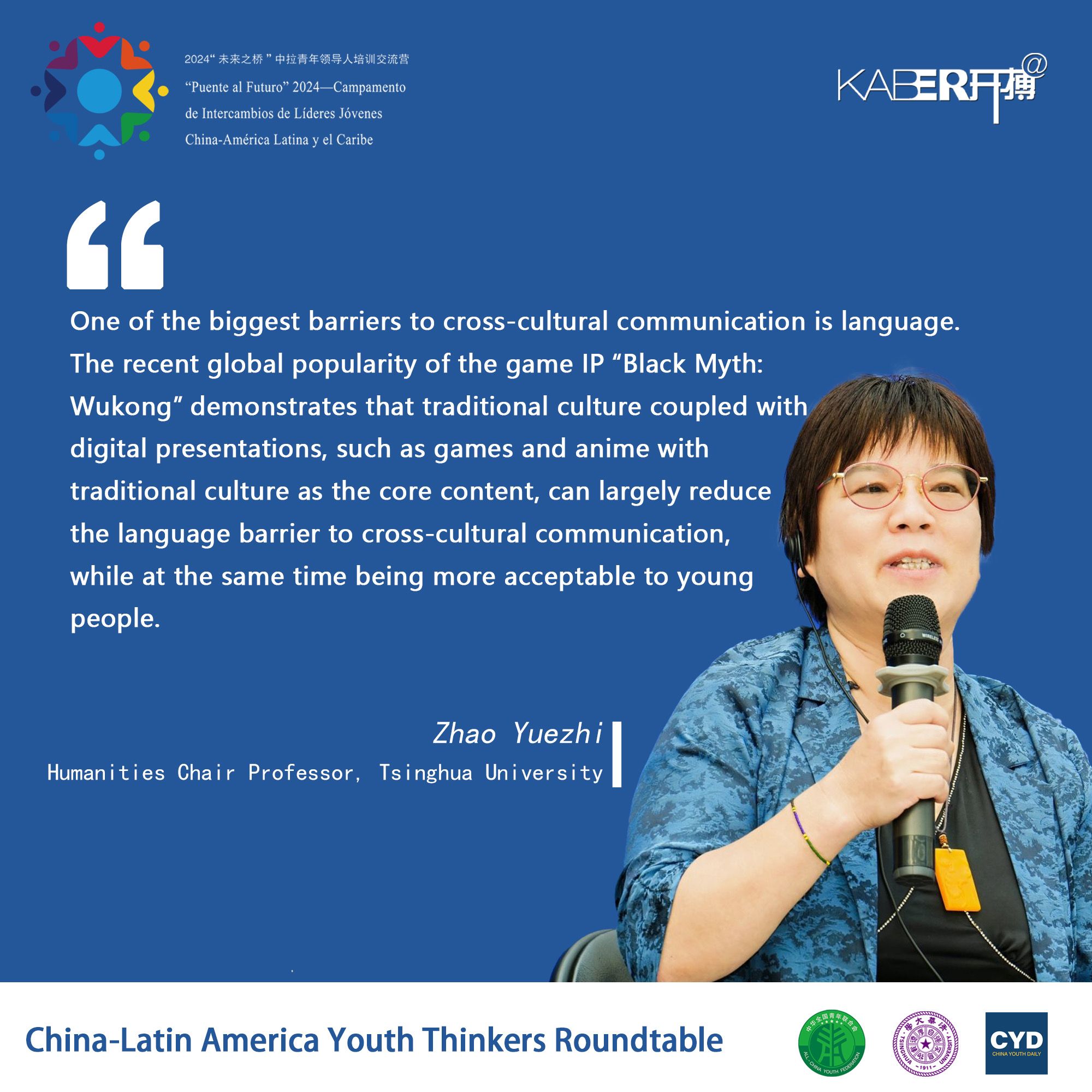
Zhao Yuezhi, a Humanities Chair Professor at Tsinghua University, shared her insights on how to bring new vigour to traditional culture and achieve good cross-cultural communication at the China-Latin America Youth Thinkers Roundtable. "One of the biggest barriers to cross-cultural communication is language. The recent global popularity of the game IP 'Black Myth: Wukong' demonstrates that traditional culture coupled with digital presentations, such as games and anime with traditional culture as the core content, can largely reduce the language barrier to cross-cultural communication, while at the same time being more acceptable to young people".
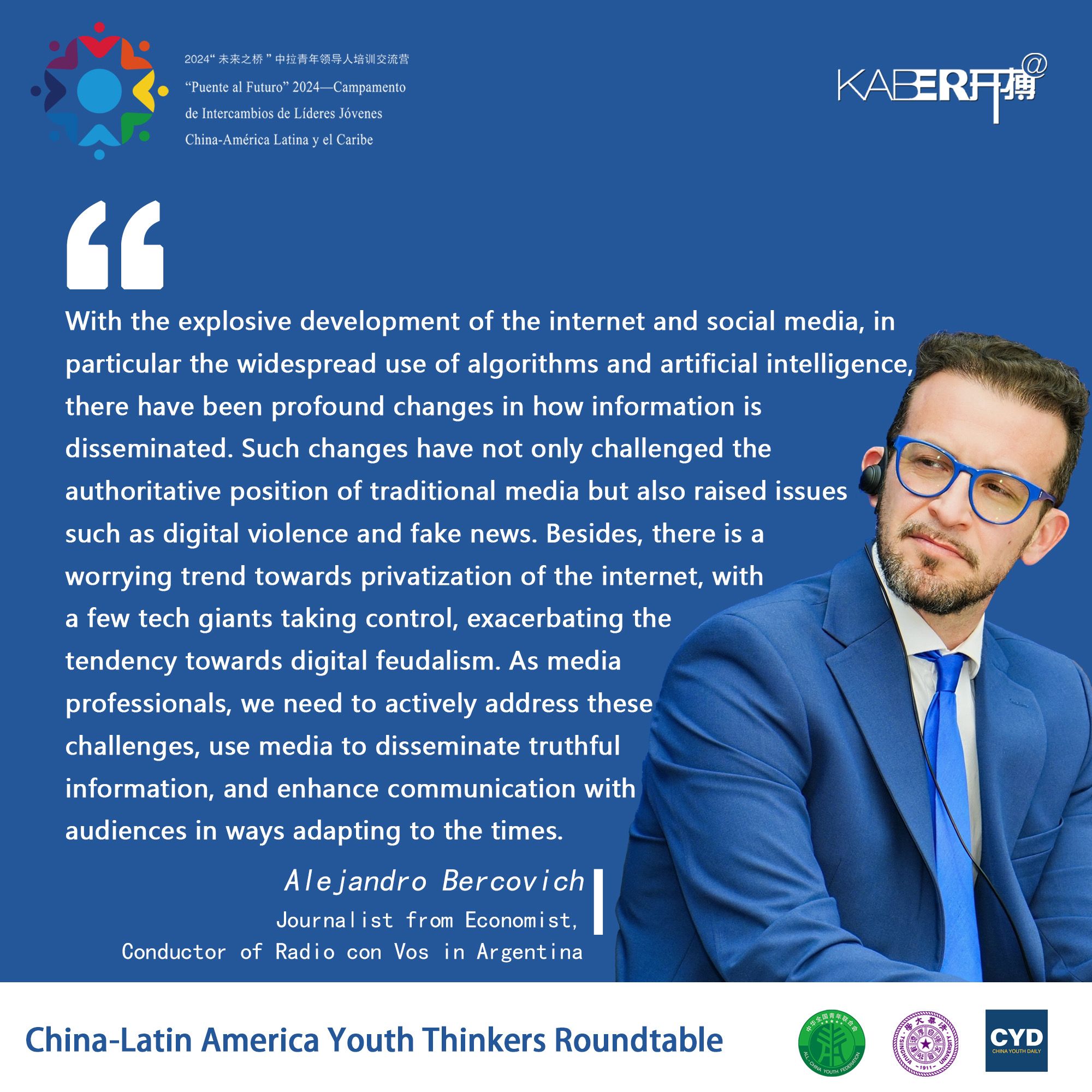
Alejandro Bercovich, Journalist from Economist and Conductor of Radio con Vos in Argentina, expressed his concerns about the challenges facing the internet and social media development at the China-Latin America Youth Thinkers Roundtable. "With the explosive development of the internet and social media, in particular the widespread use of algorithms and artificial intelligence, there have been profound changes in how information is disseminated. Such changes have not only challenged the authoritative position of traditional media but also raised issues such as digital violence and fake news. Besides, there is a worrying trend towards privatization of the internet, with a few tech giants taking control, exacerbating the tendency towards digital feudalism. As media professionals, we need to actively address these challenges, use media to disseminate truthful information, and enhance communication with audiences in ways adapting to the times".
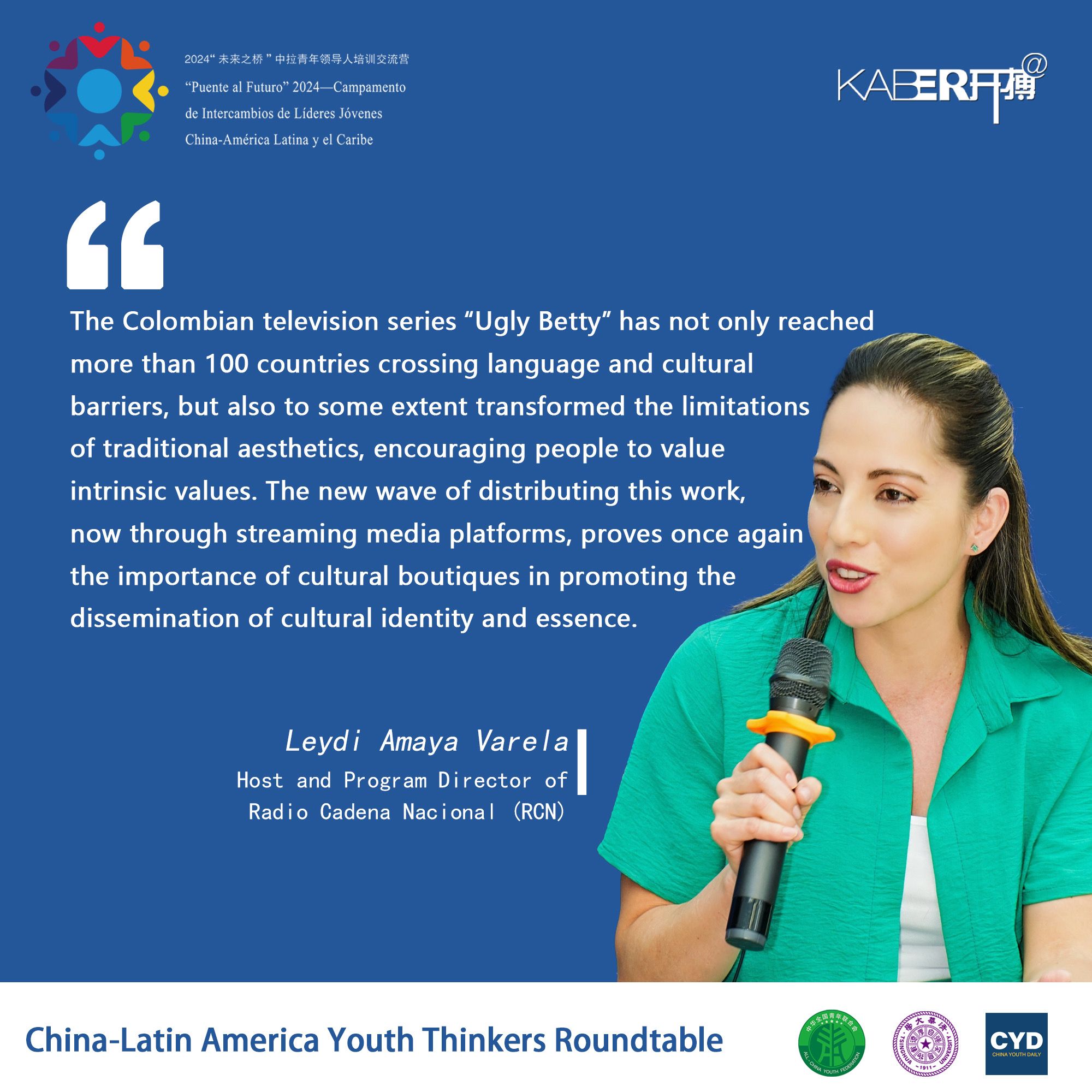
Leydi Amaya Varela, Host and Program Director of Radio Cadena Nacional (RCN), introduced typical Colombian cultural IPs at the China-Latin America Youth Thinkers Roundtable. Leydi stated, "Latin American culture is well-known for its magical realism literature, such as Marquez's works, and has had profound impacts on science and arts worldwide. For example, the Colombian television series 'Ugly Betty' has not only reached more than 100 countries crossing language and cultural barriers, but also to some extent transformed the limitations of traditional aesthetics, encouraging people to value intrinsic values. The new wave of distributing this work, now through streaming media platforms, proves once again the importance of cultural boutiques in promoting the dissemination of cultural identity and essence".
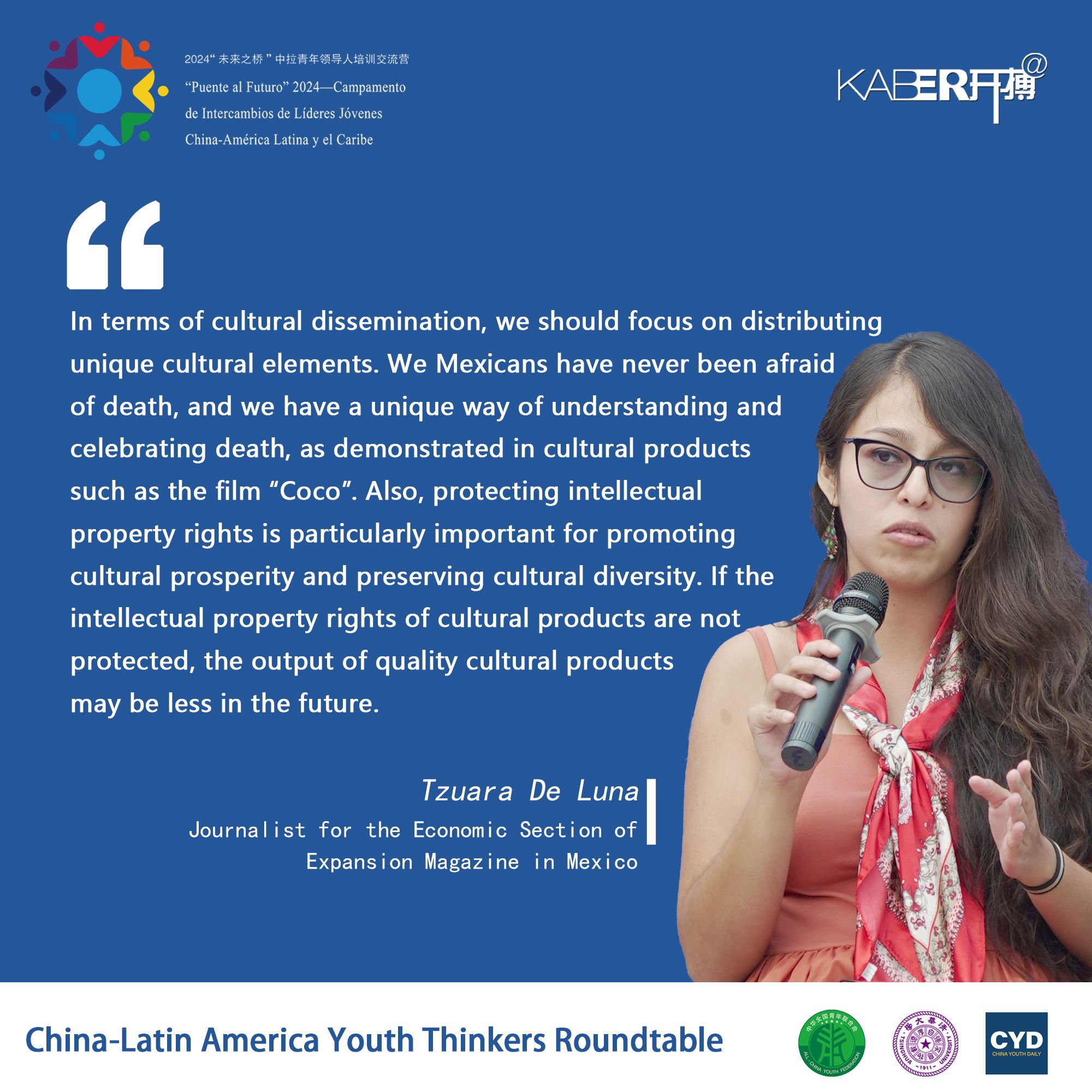
Tzuara De Luna, Journalist for the Economic Section of Expansion Magazine in Mexico, shared her insights on how to address the challenges facing the development of Latin American cultural IPs at the China-Latin America Youth Thinkers Roundtable. "In terms of cultural dissemination, we should focus on distributing unique cultural elements. We Mexicans have never been afraid of death, and we have a unique way of understanding and celebrating death, as demonstrated in cultural products such as the film 'Coco'. Also, protecting intellectual property rights is particularly important for promoting cultural prosperity and preserving cultural diversity. If the intellectual property rights of cultural products are not protected, the output of quality cultural products may be less in the future".
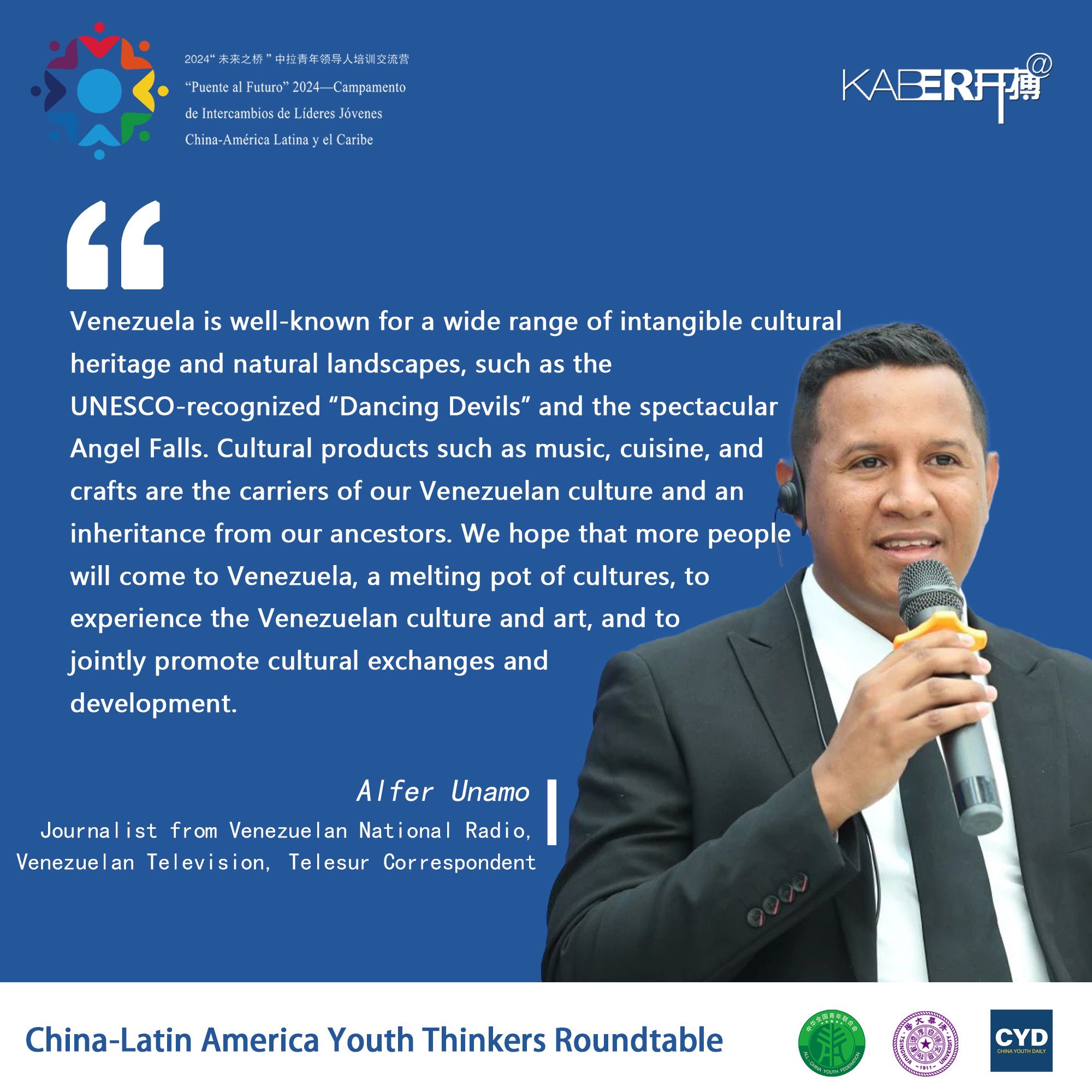
Alfer Unamo, a Venezuelan journalist, expressed his hope for more cultural exchanges in Venezuela at the China-Latin America Youth Thinkers Roundtable. "Venezuela is well-known for a wide range of intangible cultural heritage and natural landscapes, such as the UNESCO-recognized 'Dancing Devils' and the spectacular Angel Falls. Cultural products such as music, cuisine, and crafts are the carriers of our Venezuelan culture and an inheritance from our ancestors. We hope that more people will come to Venezuela, a melting pot of cultures, to experience the Venezuelan culture and art, and to jointly promote cultural exchanges and development".